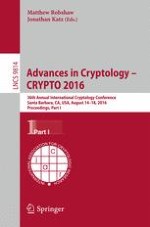2016 | OriginalPaper | Buchkapitel
Breaking the Circuit Size Barrier for Secure Computation Under DDH
verfasst von : Elette Boyle, Niv Gilboa, Yuval Ishai
Erschienen in: Advances in Cryptology – CRYPTO 2016
Verlag: Springer Berlin Heidelberg
Aktivieren Sie unsere intelligente Suche, um passende Fachinhalte oder Patente zu finden.
Wählen Sie Textabschnitte aus um mit Künstlicher Intelligenz passenden Patente zu finden. powered by
Markieren Sie Textabschnitte, um KI-gestützt weitere passende Inhalte zu finden. powered by
Abstract
-
A secure 2-party computation protocol for evaluating any branching program or formula of size S, where the communication complexity is linear in the input size and only the running time grows with S.
-
A secure 2-party computation protocol for evaluating layered boolean circuits of size S with communication complexity \(O(S/\log S)\).
-
A 2-party function secret sharing scheme, as defined by Boyle et al. (Eurocrypt 2015), for general branching programs (with inverse polynomial error probability).
-
A 1-round 2-server private information retrieval scheme supporting general searches expressed by branching programs.
